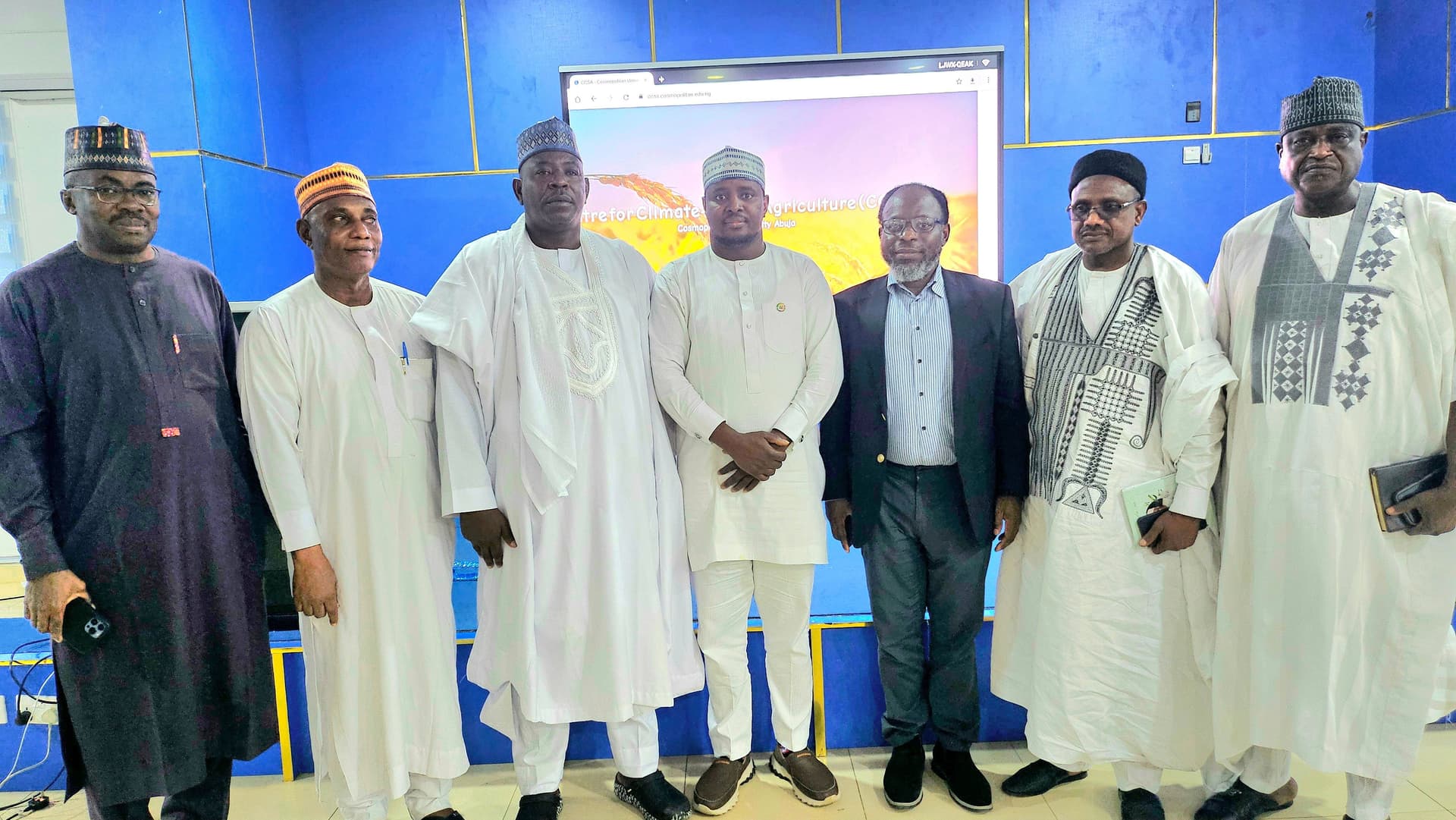Communiqué of the Induction and Orientation Program on Climate-Smart and Digital Agriculture Research Initiative
This is communiqué of the induction and orientation program on climate-smart and digital agriculture research initiative held simulteneously at the auditorium of Cosmopolitan University, Abuja and State Secretariat Dutse, Jigawa State.

Communiqué of the Induction and Orientation Program on Climate-Smart and Digital Agriculture Research Initiative
Venue: Cosmopolitan University, Abuja and New State Secretariat, Dutse, Jigawa. Date: August 28–29, 2025
We, the participants of the Induction and Orientation Program for the Climate-Smart and Digital Agriculture Research Initiative, comprising representatives of farmer associations, private sector partners, government officials, UNDP-NJFP Fellows, World Bank IDEAS trainees, and academics, agTech experts, after two days of robust engagement, resolve as follows:
1. Farmers’ Priorities
- The Maize Association of Nigeria (MAAN) emphasised the urgent need for access to innovative, private sector-led finance, support for land clearing and preparation, and a collaborative approach that respects farmers’ backgrounds and knowledge while capturing reliable data.
- The Rice Farmers Association of Nigeria (RIFAN) stressed that data must be treated as a national asset. Data enumerators must be sincere and trained to ensure integrity. They also highlighted the critical role of soil science in guiding the use of fertilisers, herbicides, and seeds, and called for government policy support for a robust agricultural data system.
- The Nigeria Cotton Farmers Association (NACOTAN) and Cotton Farmers Cooperative underlined the importance of viewing cotton through a comprehensive value chain lens. They reaffirmed that data accuracy is critical and agreed to adopt CCSA as a trusted data provider.
- The Nigerian Women in Agribusiness (NIWAB) called for greater recognition and support for women’s central role in the agricultural value system, stressing that women must be properly included and empowered in innovation systems. They emphasised the need for access to finance, training, and technologies tailored to women farmers, as well as deliberate policies to ensure equity in land access, digital tools and participation in decision-making. NIWAB reaffirmed its commitment to partnering with CCSA to promote gender-sensitive climate-smart agriculture that empowers women as key drivers of transformation across the agricultural value chain.
2. Youth and Fellows
- The UNDP-NJFP Fellows requested more clarity on identity, logistics, security, responsibility, and process, which were duly addressed by CCSA leadership as follows:
- Identity – The Centre for Climate-Smart Agriculture (CCSA) will issue Fellows with both physical and digital identity cards for official recognition during the course of their assignment.
- Logistics and Security – CCSA will work closely with relevant Farmers’ Associations and community structures to ensure that Fellows have the necessary security cover and support when engaging with farmers in the field.
- Roles and Responsibilities – The leadership of CCSA will provide detailed clarification on the Fellows’ responsibilities within the project framework, including their research, reporting, and community engagement functions.
- Process Assurance – The operational process for field deployment, supervision, and reporting was explained to ensure smooth coordination and accountability.
- Welfare and Incentives – In recognition of the Fellows’ commitment, CCSA confirmed that they will receive a bonus in addition to their regular salary, based on their performance.
- Partners reminded fellows that their roles are strategic to the success of the initiative and that they must demonstrate seriousness, professionalism, and commitment in their duties.
3. Government, Private Sector and Other Institutional Partners Commitments
- Prof. Ademola, the Senior Special Adviser to the Minister of Agriculture and Food Security, reminded participants that “without pain, there is no success,” stressing that meaningful agricultural transformation requires resilience, persistence, and the courage to embrace change. He drew attention to the long-standing weakness of Nigeria’s agricultural extension services, describing them as the most critical gap in delivering innovation to the last mile. He therefore called for renewed and sustained investment in extension as the principal mechanism through which farmers, particularly those in rural communities, can access knowledge, skills, and support to improve productivity and sustainability.
- In addition, Prof. Ademola underscored the urgency of embracing innovation across the sector. He highlighted the responsible adoption of advanced technologies, including biotechnology and genetically modified organisms (GMOs), as tools that, when deployed ethically and strategically, can help Nigeria address food insecurity, climate challenges, and the demand for higher yields.
- He urged participants to think beyond traditional models, to anticipate the future of agriculture, and to apply creativity, innovation, and effective communication as indispensable drivers of transformation. He emphasised that Nigeria must not only catch up with global trends but also chart its own path toward a climate-smart and technology-enabled agricultural system.
- Prof. Ademola challenges the Fellows and stakeholders present to become champions of change, bridging the gap between research and practice, and ensuring that innovation translates into tangible impact for farmers and communities nationwide.
- The Managing Director of ASOLAR Ltd. (The largest solar energy as a service provider in Nigeria) encouraged Fellows to view themselves as entrepreneurs from day one, cultivating resilience in the face of challenges and approaching their roles with a winning mindset. The company emphasised that fellows should view themselves not only as employees but also as innovators and solution providers.
- For CCSA and its partners, ASOLAR underscored the importance of willpower, synergy, collaboration, sustainability, data integrity, and leadership as guiding principles for success. The company pledged to work closely with CCSA to expand access to finance and solar-powered irrigation solutions for farmers. This will be achieved through innovative financing models, including pay-as-you-use systems and produce-based repayment after harvest, thereby reducing barriers for smallholder farmers and promoting inclusive access to climate-smart technologies.
- The Coordinator of the Nigeria Jubilee Fellows Programme (NJFP), who participated in the induction, reaffirmed the Programme’s commitment to supporting the Centre for Climate-Smart Agriculture (CCSA). He underscored the need to strengthen data integrity, youth engagement, and innovation in the agricultural sector.
- Similarly, the Coordinator of the National Board for Technical Education (NBTE) Innovation Development and Effectiveness in the Acquisition of Skills (IDEAS) Project ( a Federal Ministry of Education, supported by the World Bank) expressed strong alignment with CCSA’s mandate. He noted that IDEAS program provides a structured platform for developing technical and vocational skills, incubating innovations and certifying expertise. He affirmed the programme’s readiness to work with CCSA to ensure that both Fellows and local communities benefit from capacity building, technology adoption, and enterprise development opportunities.
5. CCSA Commitments
- The Centre for Climate-Smart Agriculture (CCSA) reaffirmed its standing as the central and trusted data provider for all collaborating farmer associations and strategic partners through its Farmer and Farm Information System (FAFMIS). This role is anchored in its mandate to deliver evidence-based research, digital innovation, and inclusive capacity-building initiatives, ensuring that decision-making across both farmer-level activities and national policy forums is guided by robust, high-quality data.
- CCSA remains deeply committed to the highest standards of data integrity, research ethics, and quality assurance. In alignment with its mandate areas, Research and Innovation, Digital Transformation, Capacity Building, Policy & Advocacy, Sustainable Practice, and Public–Private Partnerships, the Centre pledges to foster dynamic collaborations that integrate climate-smart agriculture practices with digital agriculture innovations.
- Through initiatives such as AI-powered climate advisory services, digitalisation programmes for farmers, incubation for young farmers, and inclusive empowerment activities for women in agriculture, CCSA will ensure that climate-smart and digital agriculture solutions are practical, scalable, and transformative.
6. Shared Vision
All stakeholders reaffirmed a collective vision for advancing climate-smart and digital agriculture in Nigeria. They agreed that the success of this initiative rests on the following pillars:
1. Data as a Shared Public Good
- Elevating agricultural data to the status of a shared national asset that informs policy, investment and innovation at local, state and national levels.
- Ensuring open access, interoperability and transparency in data systems while upholding the highest standards of integrity, ethics and accountability.
- Using robust, evidence-based data to guide farmer-level interventions, state planning, and national agricultural transformation.
2. Farmer-Centred Engagement
- Building trust and fostering respectful, cordial relationships with farmers as co-creators of knowledge and innovation.
- Valuing and documenting indigenous knowledge systems, and integrating them with scientific research and digital tools to develop context-specific solutions.
- Recognising farmers not merely as beneficiaries but as partners in shaping agricultural transformation.
3. Strengthening Extension and Technological Innovation (AgTech)
- Revitalising agricultural extension as the last-mile delivery mechanism that translates research into practice.
- Expanding the application of soil science information systems, precision agriculture, remote sensing, hyperspectral technologies, GIS, AI/ML, solar-powered irrigation, cooling, refrigeration, heating, drying and other climate-smart and technology tools to increase yields, reduce waste, enhance resilience and value, restore biodiversity and ecosystems.
- Building the capacity of extension workers and equipping them with digital tools, AI-driven advisory services, and decision-support systems for real-time engagement with farmers and the rest of the value chain.
4. Culture of Innovation, Collaboration and Sustainability
- Fostering an enabling ecosystem where innovation thrives, encouraging creativity, responsible risk-taking, responsible use of AI and adoption of other advanced technologies (including biotechnology and GMOs).
- Strengthening collaboration among government, academia, the private sector, farmer associations, and development partners to drive shared progress.
- Embedding sustainability as a non-negotiable principle, ensuring that agricultural development enhances livelihoods, protects the environment and secures food systems for future generations.
This shared vision underscores that agricultural transformation in Nigeria will depend not on isolated initiatives but on collective ownership, inclusive partnership and a steadfast commitment to climate-smart and digital innovation.
Resolution
We resolve to work together under the coordination of CCSA to advance climate-smart and digital agriculture across Nigeria. We pledge to uphold the values of integrity, collaboration, and innovation as we build a resilient agricultural system for farmers, youth and the nation.
Adopted in Abuja, this 29th day of August 2025.
